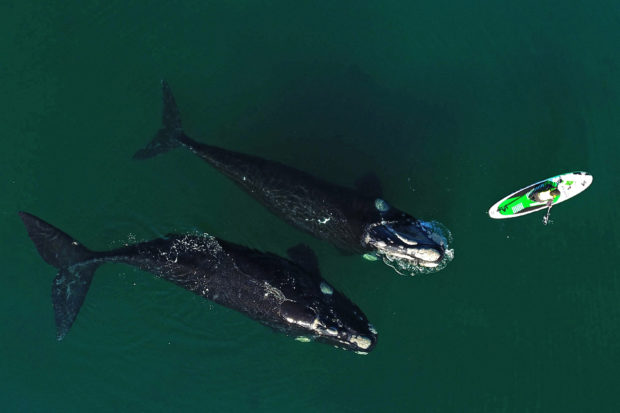Argentine scientists worried after spate of whale deaths

Photo released by Telam news agency of an aerial view of southern right whales (Eubalaena australis) swimming near a woman practicing standup paddleboarding in Nuevo Gulf, off the coast of Puerto Madryn, Chubut province, Argentina, on August 31, 2021. AFP FILE PHOTO
BUENOS AIRES — A string of whale deaths in recent days in southern Argentina have worried scientists, who think a micro-algae could be to blame.
From September 24 to October 2, at least 13 southern right whales died in the Nuevo Gulf close to the Valdes Peninsula in Argentine Patagonia, an area that is a sanctuary and breeding ground for the huge mammals, the Whale Conservation Institute (ICB) said.
Authorities have started performing autopsies on the whales that have been recovered and have begun testing the water and mollusks “to determine the presence of possible biotoxins linked to the proliferation of harmful algal blooms known as red tides,” said whale program coordinator Agustina Donini in an ICB statement released Monday.
None of the whales observed so far have displayed any signs of injuries or trauma, and all were well-fed, the ICB said.
The deaths come at a time when authorities have been celebrating a 50-year-high number of cetaceans for the season in an area that attracts whale watching tourists.
Article continues after this advertisementThe large number of dead whales in such a short space of time suggests that “a local environmental variable” is to blame, said Marcella Uhart, another whale program director
Article continues after this advertisementAlgal blooms produce natural toxins that can be harmful to other organisms living in the water.
Their pigment can make the surface of the water look red, giving the phenomenon the name “red tide.”
Fabian Gandon, mayor of the nearby town of Puerto Piramides, told reporters there had been “an unusual increase in… red tides” in the Nuevo and San Jose gulfs.
The local population has been advised to avoid eating mollusks, which can store the toxins created by the algal blooms.
Despite the recent deaths, authorities have recorded more than 1,400 whales in the Nuevo and San Jose gulfs, the largest number in more than 50 years.
RELATED STORIES
230 pilot whales stranded in Australia, ‘about half’ feared dead
Four dead whales wash ashore on San Francisco Bay area beaches